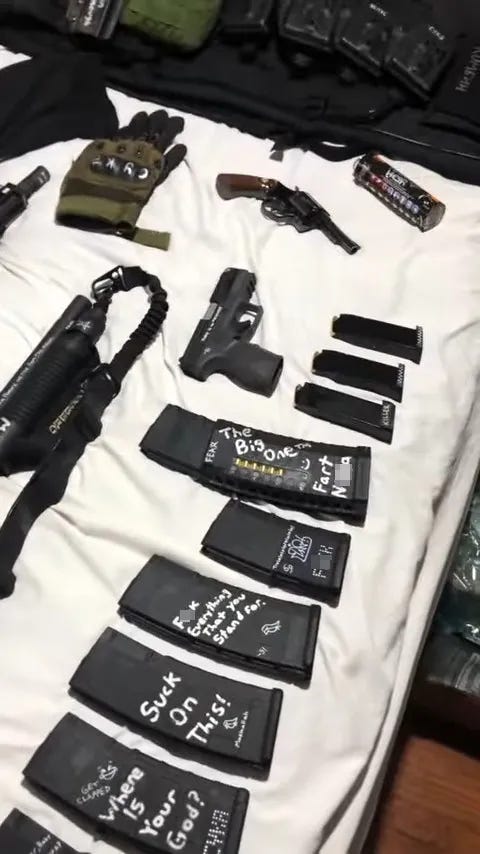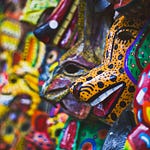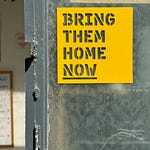Reflecting on the horror of last week's Annunciation Church and School Shooting, this is the text of my Shabbat sermon on Parashat Shoftim. Read or watch below. Listen above.
August 30, 2025 ~ 5 Elul 5785
“O God, if You would only slay the wicked—
you murderers, away from me! — who invoke You for intrigue,
Your enemies who swear by You falsely.”
These words come from Psalm 139 (v. 19-20), the Psalm which was recited at the beginning of Mass at the Annunciation Church in Minneapolis this Wednesday morning. Some 200 children and adults attended the service marking the beginning of the school year. As the prayer reached its conclusion and just before parishioners were to proclaim “Alleluia,” bullets rained in through the windows. Two children, 10-yr-old Harper Moyski and 8-yr-old Fletcher Merkel were murdered. Fifteen other children ages 6-15 and three adults in their 80’s were injured. My heart breaks for the Catholic community, for our friends at St. Ignatius and other parishes, for Minnesotans, for America once again to confront yet another massacre of children.
There are some horrifying but heartening tales. School buddies shielding one another including at least one who took a shotgun blast to his back while covering another child. Staff members scrambling to get young children under the pews, sometimes lying on top of them to protect them. Kids who didn’t understand what was happening at first, who thought for a moment flying shards of stained glass were confetti to celebrate the first week of school.
In a 2012 message titled “Gun Worship is blasphemy,” Rabbi Eric Yoffie the President of the Union for Reform Judaism wrote: “If this massacre of innocents in Newtown will not rouse the nation's conscience, then nothing will. Therefore, this is the moment to mobilize the idealism, energy and anger of the American people.” That was thirteen years ago, 6 days after the Sandy Hook Elementary School Massacre in which 20 children and 6 adults were slain.
“Gun worship is blasphemy.”
I’ve given sermons before about the proliferation of guns in America, about how hundreds of people are shot every day, about how many of the weapons now permitted are deadlier, allowing violent people to kill more innocent people, more rapidly. These things remain true, of course, but I’ve been thinking more lately about the why. Why do so many Americans buy so many guns? And why do some Americans buy an absurd number of guns – half the guns in the US are held by a fraction of our population.
I think the answer has to do with at least two of the three cardinal sins in Jewish tradition, maybe all three. Did you know we have cardinal sins? We do, sort of. As you know life is sacred in our tradition, so should you be given the choice between, say, eating crab cakes and dying, you should eat crab cakes. If you’re from Boston, it might be clam chowder, Chicago, baby back ribs. Hawaii? I guess it would be ham and pineapple pizza – which truth be told I’d probably die before eating that. The point is that whether it’s kashrut, Shabbat observance, even serious interpersonal crimes like theft, if someone or life’s vicissitudes forces you to choose between violating the mitzvot and your own life – you do what you need to survive.
But there are three sins that according to Jewish law, are:
,יֵהָרֵג וְאַל יַעֲבֹר
that we must not violate under any circumstances, even if (God forbid) there is a gun to our heads. And they are: murder, sexual immorality and idolatry (Sanhedrin 74a, MT Yesodei Torah 5:7). The first is obvious: If life is sacred, one may not take a life even to save our own. Now to be clear, Jewish law doesn’t prohibit killing, but to murder is strictly forbidden, so much so that we must do מסירת נפש, that is give up our own soul rather than take another. Similar logic can be applied to immoral sexual behavior like rape where the crime is the degradation of another tzelem, another manifestation of the Divine image. But the third example may be a bit less clear.
The sin of avodah zarah, idol worship, shows up in our parasha (Deu. 17:2-6):
כִּֽי־יִמָּצֵ֤א בְקִרְבְּךָ֙ בְּאַחַ֣ד שְׁעָרֶ֔יךָ
If there is found among you…a man or woman who has affronted the LORD your God and transgressed God’s covenant… turning to the worship of other gods and bowing down to them, to the sun or the moon or any of the heavenly host, something I never commanded…you shall stone them, man or woman, to death.
The burden of proof is high for capital punishment – they have to have been warned, there need to be witnesses – but the point here is that idolatry is a very serious aveirah, and one that according to our tradition we should be yehareg v’al ya’avor, give up our own life before submitting to it.
Why is that? Because idolatry properly understood, like murder, like rape, is about the subordination of God and the degradation of our humanity. Which brings me to our American gun problem. I would suggest to you that our problem of guns is a problem of idolatry. Why are there so many guns, more guns than people in this country? Because too many Americans worship them. Sometimes there is a literal alignment of religion and guns. The memeification of guns within Christian nationalist rhetoric is an obvious example. Google “guns” and “Jesus” and click on images and you’ll see what I’m talking about.
But for many Americans there seems to be a degree of worship for the guns themselves. One of many books and essays suggesting this is a recent piece in the Cambridge Press journal Politics and Religion titled “The sacred gun: the religious and magical elements of America's gun culture.” The authors (Froese, Li, and Menchen) argue that while nearly all gun owners feel their weapons provide them a sense of security, a “distinct and crucial sub-set of owners express an additional and strong attachment to their weapons.” They call this “gun sanctity.” Borrowing from Emile Durkheim’s conceptual categories of “sacred” and “profane,” they write that while many gun owners are also religious Christians, “In the case of gun culture, the concrete object of the gun provides the owner with feelings of moral goodness, social value, and control without reference to or need of the divine.”
This kind of magical thinking seems to have been at play in the mind of 23-year-old Robin Westman, who emptied 116 rifle rounds and three shotgun shells into twenty human beings, most of them children. The shooter’s weapons were covered with references to other mass slayings and their perpetrators, not to mention an almost equal opportunity hatred for just about any group you could imagine. A YouTube manifesto described the planned attack as the shooter’s “masterpiece” and “art,” and said Westman “couldn’t stop thinking about” the anticipated “shock on their faces.” The attack would be “the perfect way to say goodbye... By the time it happens, I won’t care about anything else anymore.” The cruelty, the violence – and the instruments of that violence – were the point. I’m reminded of the Malbim’s teaching about Amalek. Why is Amalek the quintessential enemy of the Jewish people? Because, among other things, they are described as:
לֹ֥א יָרֵ֖א אֱלֹהִֽים׃ (25:18)
Amalek isn’t interested in violence on behalf of some god. Amalek has no fear of God. The randomness, the caprice is the point. And this problem, the sacrifice of human life in obeisance to indiscriminate violence and weapons is the very essence of idolatry.
What does our tradition offer here? While we have no guns in ancient rabbinic literature (obviously), the rabbis were circumspect about weapons and their place in society. Mishnah Shabbat (6:4), the tractate we’ve been reviewing in our Rise & Learn sessions, asks whether one may carry a weapon on the Sabbath. The answer is no, but the reasoning may be surprising.
“A man may not go out with a sword, bow, shield, club, or spear, and if he does go out, he incurs a sin-offering.” You may know that it’s impermissible to carry objects on Shabbat and to transfer them from one domain to another. But we might think these items are just accessories, or just like any other objects. Indeed, the very next Mishnah does say that women may go out with ribbons made of animal hair and frontlets or head-bangles. And, in fact, Rabbi Eliezer says תַּכְשִׁיטִין הֵן לוֹ, the weapons are merely ornaments for men who carry them. But the Sages disagree saying, “They are nothing but a disgrace, as it is said, ‘And they shall beat their swords into plowshares, and their spears into pruning hooks: lo yisa goy el goy cherev…, nation shall not lift up sword against nation, neither shall they learn war anymore’” (Isaiah 2:4).
Chaz”al were not pacifists. They understood the need for weapons in certain contexts, namely for self-defense. But they also understood them to be a necessary evil, a compromise for an unredeemed world. Shabbat, you see, is meant to be me’ein olam habah, a “taste of the world to come.” Weapons, swords, bows, clubs, and certainly AR-15’s are inconsonant with a day meant to elevate existence.
There’s a similar notion with regard to knives at a meal. The Shulchan Arukh (16th century code of Jewish law) describes the custom of covering knives before Birkat Hamazon. The Taz (Rabbi David Halevi Segal) explains that knives are reminiscent of swords and swords represent warfare and the shortening of life. The table, conversely, represents the altar, a symbol of peace and the extension of life – especially when we offer the Grace after Meals. Benching is peppered with prayers for peace – Oseh Shalom Bimromav… A’nai yevarech et amo vaShalom. There’s no b’racha for a sword, and there’s no b’racha with a sword (or a gun) in view.
The altar, like the dinner table, is a place where the focus of our attention is not on weapons but on one another and on God. This is why the Torah tells us the altar was made from unhewn stone, so that iron implements, similar to weapons of war, were not utilized to fashion an object of peace. In fact, there’s a legend which suggests there was a magical creature who cut the stone so that iron tools were unnecessary. That creature was called the Shamir. Paradoxically, the same passage in Shulchan Aruch says one need not cover knives on Shabbat on Yom Tov, but this seems to be because the atmosphere of those days is so infused with a sense of shalom, that we would not be inclined to confuse butter knives (or even steak knives) with weapons.
Too many Americans worship their guns, but our Jewish tradition has no interest in this sort of idolatry. We bless objects that uplift human endeavors. We say a b’racha and shake the lulav. We say a b’racha and sound the shofar. We don’t bless swords or spears or guns. We don’t celebrate violence, even when it’s called for, and Jews who do so deserve our condemnation. In fact, our parasha grants an honorable discharge for warriors who haven’t yet enjoyed a new home or vineyard or consummated a marriage. Life takes precedence, even in war.
The words of a Jewish b’racha over an object are not about the object. They understand the object as a vehicle for holiness (asher kiddeshanu b’mitzvotav, who sanctifies us with mitzvot…). I don’t know if Robin Westman uttered a blessing before opening fire, but I wouldn’t be surprised. The calamity of gun worship is worse than simply worshipping objects as if they’re gods. Westman’s true sin, as is the case with all murder (or rape for that matter), is that the actions of the perpetrators reduce their victims to something less than human. Objects, guns, become gods. People become objects. There’s no b’racha for a gun. But children are a blessing. We must solve our gun problem, but we cannot do so unless we confront our idolatry problem.











